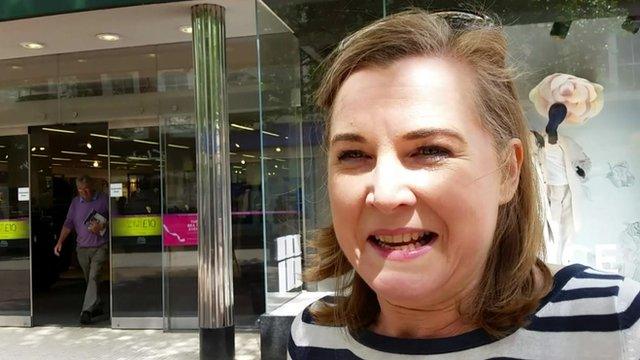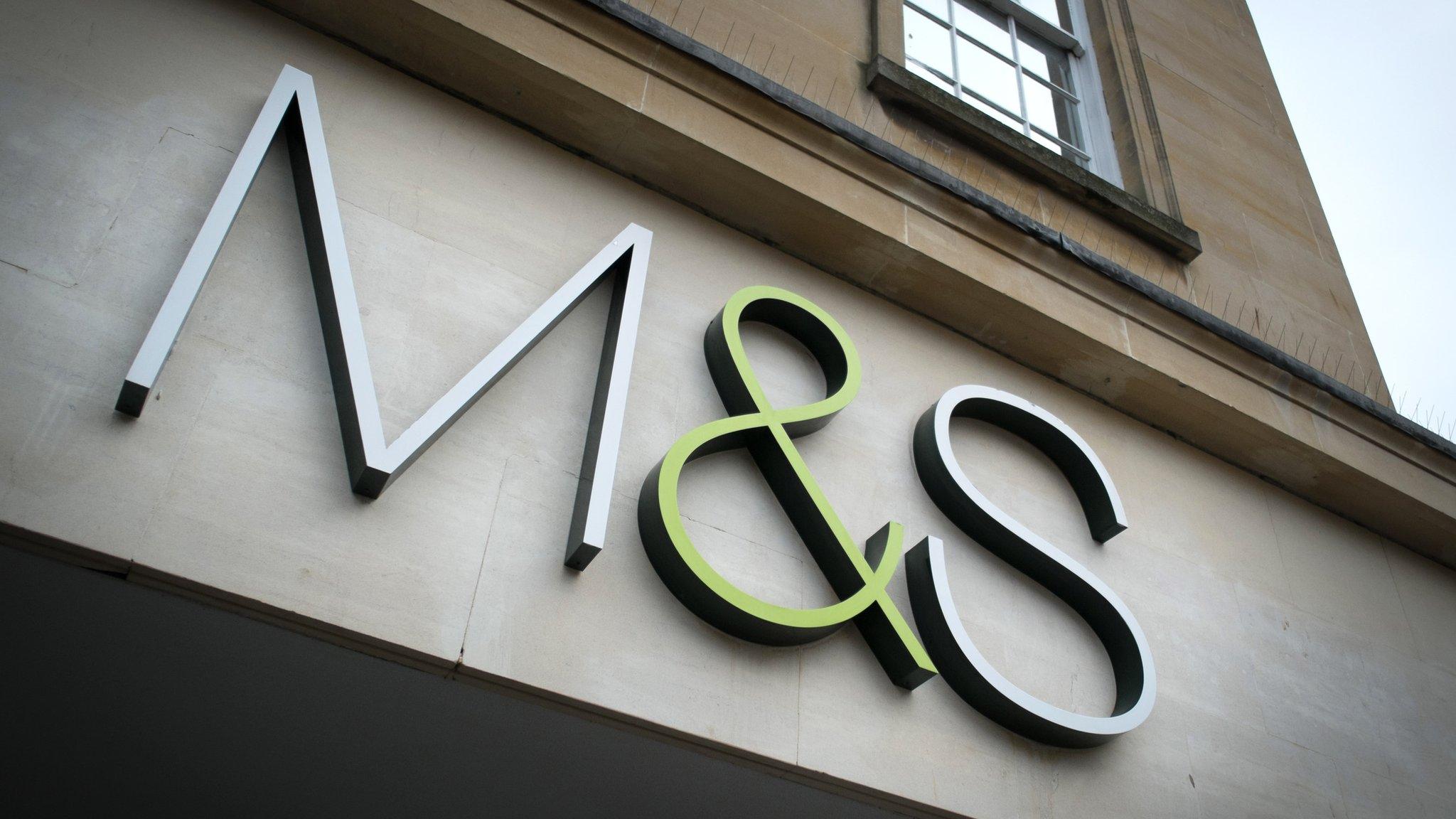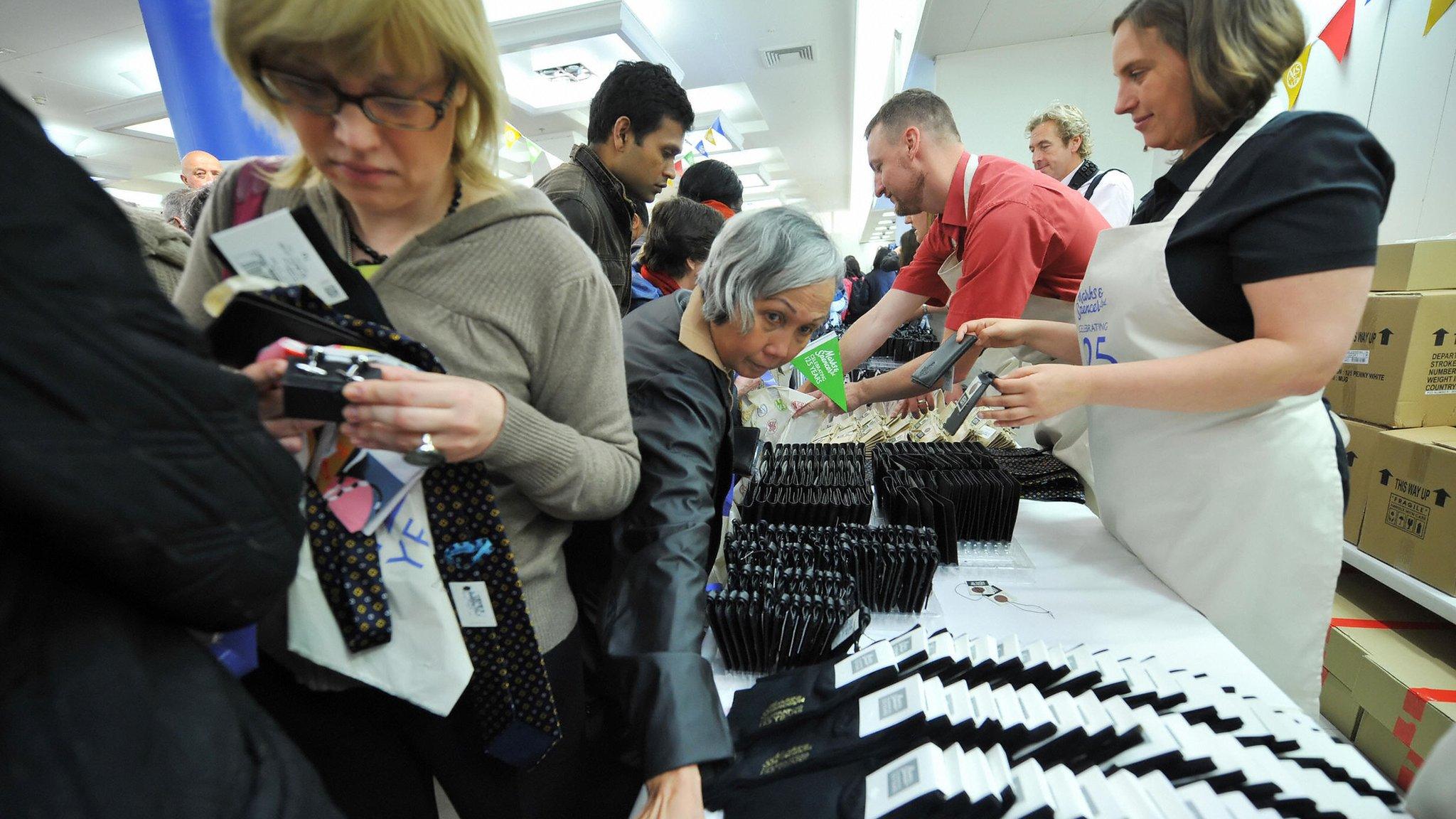Marks and Spencer warns revamp plan will hit profits
- Published

Alexa Chung launched her M&S range last month
Marks and Spencer's new boss has unveiled plans to revive the retailer's clothing and homeware business, but warned the changes would hit profits.
Steve Rowe, who took over as chief executive last month, says he intends to lower clothing prices and improve style, fit and quality.
He also wants to reduce the number of sales promotions, and increase the number of staff in stores.
But the warning of lower profits sent shares in M&S down by more than 10%.
The turnaround plans were announced as M&S reported its annual results, with underlying profits in the year to 2 April rising 4.3% to £689m.
However, statutory profits, the measure all companies must provide, fell 18.5% to £488.8m after taking into account one-off costs of £200m.
These costs included about £50m to cover PPI mis-selling at M&S Bank, as well as costs resulting from store closures in its international business.
"Ask the new Marks and Spencer boss to come and speak to me"
In the retailer's results statement,, external Mr Rowe said: "Our results last year were mixed. We continued to outperform on Food but we underperformed on Clothing & Home sales."
Underlying sales in the troubled clothing and homewares division fell by 2.9% during the year.
Mr Rowe said he had already cut the price of 3.5 million clothing items in the past couple of weeks.
In addition, there are plans to reduce the number of sales promotions in the stores.
Mr Rowe said: "These actions, combined with the difficult trading conditions, will have an adverse effect on profit in the short term."
The new strategy also includes a review of its shops, which could lead to some of the stores closing. The outcome of this review will be announced in the autumn.
'Mrs M&S'
Mr Rowe told the BBC's Today programme that he would move the emphasis away from fashion to "stylish contemporary clothing".
He said M&S now had a very clear idea of who its customers are: "We've got a very clear idea who our customer is - and Mrs M&S, we need to cherish and celebrate her and make sure we're giving her exactly what she needs at the right time."
But while he says he is determined to return homeware and clothing to growth he warns the sectors are seeing "pretty tough" trading conditions.
Steve Rowe says he has a plan in place to recover sales in the clothing and home sections
Selling clothing in the UK is a highly competitive business and M&S faces tough competition from Next and Zara, among others. Next has also warned recently its profits would not match expectations.
Marks and Spencer is the biggest clothing retailer in the country by sales and has 32 million customers.
Steve Clayton, from Hargreaves Lansdown stockbrokers, says that gives it "plenty of relationships to strengthen". But, he says, there is little he can see in the review that has not been tried before at the company.
Mr Rowe, who took over from Marc Bolland, is the latest in a line of bosses at Marks and Spencer spending their first weeks and months pledging and making changes.
He has already announced plans to cut the size of the top management team in an attempt to bring the company closer to its customers, and is also promising to invest in his staff in the stores.
Pay and pensions
M&S also announced changes to pay for its 70,000 store staff. Pay will rise by 15%, although some workers will see pay for Sunday and night shifts cut.
The base pay for qualified shop workers will be increased from £7.41 an hour to £8.50 an hour outside London and will be increased to £9.65 within Greater London.
However, the retailer also announced it was planning to close its final salary pension scheme to new contributions from existing members, affecting 11,000 staff. The scheme has been closed to new members since 2002.
Existing members of the final salary scheme will be moved to a defined benefits scheme - which does not guarantee a set pension on retirement - in April next year.
M&S said it was consulting with its staff on both the pay and pension changes.
Food improves
Revenue for the M&S group as a whole rose 2.4% over the year to £10.6bn.
The company said that its food business, which accounts for about half of its profits, continued to perform well.
Underlying sales grew by 0.2% over the year, and M&S said it had increased its share of the market
M&S opened another 75 of its smaller Simply Food outlets over the year and said these were doing even better business than it had hoped.
- Published25 May 2016

- Published24 May 2016

- Published12 May 2016

- Published7 April 2016
